Key takeaways:
- Developmental milestones are unique to each child and serve as helpful guides for growth, rather than strict timelines.
- Tracking milestones is essential for early intervention, boosting confidence, and guiding targeted activities to support development.
- Environmental factors, parental involvement, and social interactions play crucial roles in a child’s developmental progress.
- Engaging activities like sensory play, imaginative play, and reading together significantly enhance a child’s skills and emotional growth.
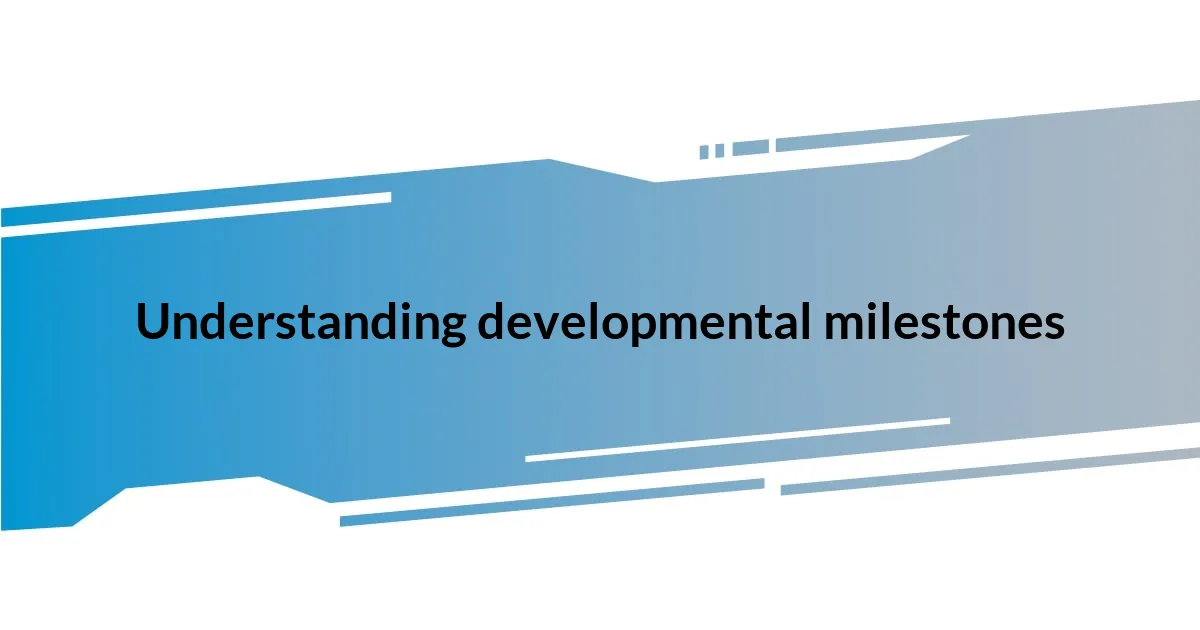
Understanding developmental milestones
Understanding developmental milestones can feel like navigating a complex puzzle. I remember watching my niece take her first steps, which brought a flood of emotions—joy, pride, and even a tinge of sadness as I realized my baby was growing up. These milestones serve as benchmarks, helping us gauge a child’s physical, emotional, and cognitive growth, but have you ever wondered how they impact our expectations as caregivers?
As I observe children develop, I’ve noticed that milestones can vary widely. For instance, my friend’s son started talking in full sentences at just two years old, while my daughter was content to babble for a bit longer. This variability can spark anxiety—are we doing enough to support their development? It’s essential to remember that each child is unique, and milestones are guides rather than strict timelines.
Reflecting on my journey as a parent, it’s intriguing to see how certain milestones impact a child’s confidence. When my son mastered riding his bike without training wheels, he beamed with pride, a spark of independence igniting in him. Isn’t it fascinating how these small victories not only shape their skills but also their self-esteem and social interactions? Understanding these milestones often means embracing the highs and lows of each child’s individual path.
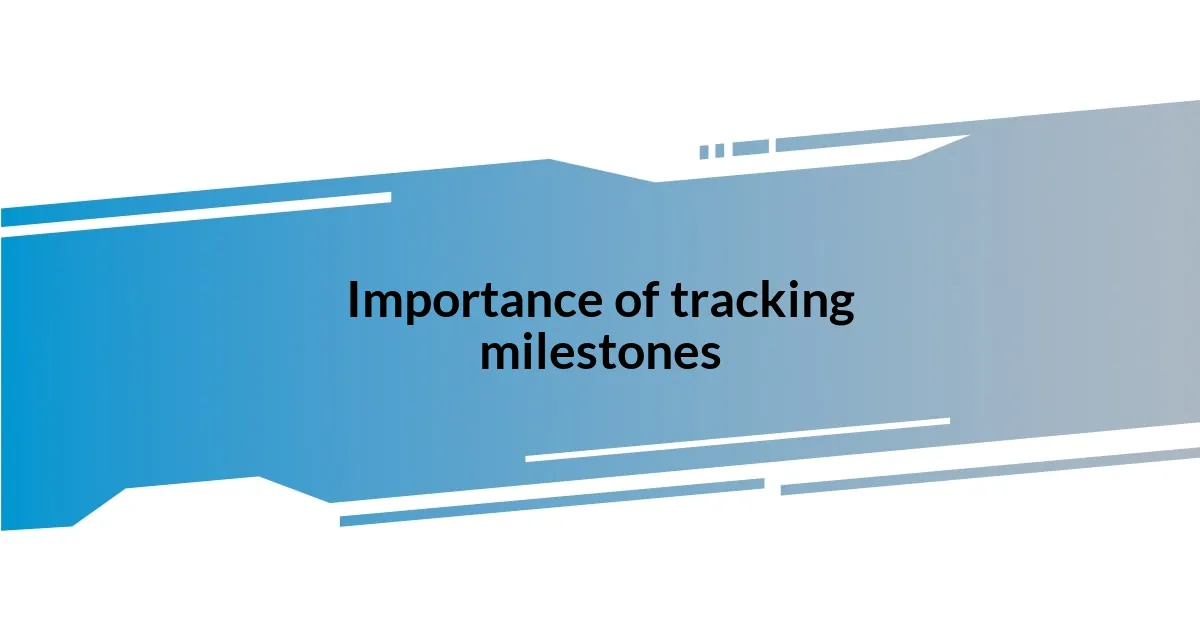
Importance of tracking milestones
Tracking developmental milestones is crucial for recognizing how children progress through their early years. I’ve often found that keeping an eye on these benchmarks helps me understand whether my child is on the right path. When my daughter first learned to stack blocks, it was a sign of her fine motor skills improving. It made me realize how important it is to celebrate these small wins, as they are vital indicators of her growth.
Here are some key benefits of tracking developmental milestones:
- Early Intervention: Identifying delays can lead to timely support, ensuring children receive the help they need sooner rather than later.
- Confidence Boost: Acknowledging milestones fosters a sense of achievement for both the child and the caregiver. I always cheered loudly for every new skill my kids mastered, igniting their confidence and enthusiasm.
- Targeted Activities: Knowing where a child stands can guide caregivers in choosing appropriate activities that promote further development, like engaging in imaginative play to enhance language skills.
- Building Strong Relationships: Discussing milestones with other parents can create connections and offer support, knowing we’re all in this together—sharing challenges and triumphs alike.
Keeping track of these markers not only helps in ensuring the child’s development is on track but also fosters emotional connections that can last a lifetime.
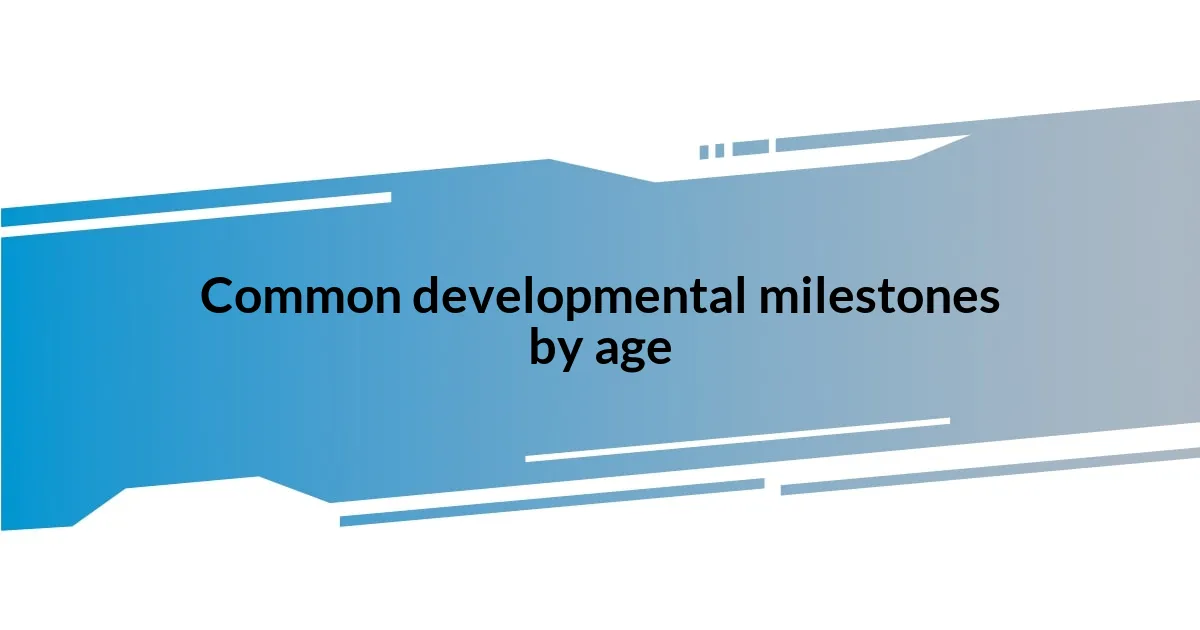
Common developmental milestones by age
Understanding common developmental milestones is crucial for parents and caregivers alike. From the moment I first saw my son roll over, I was filled with a sense of wonder—he was conquering the world one movement at a time. By age one, most children begin waving goodbye and clapping hands, which not only boosts their social skills but also brings such joy to family interactions.
As children approach two years, language begins to blossom. I vividly remember when my niece began stringing two-word phrases together. Seeing her communicate her desires not only made her more independent but also deepened our bond as we could share moments of laughter and understanding. It’s remarkable how these milestones are not just about physical development; they shape emotional connections, too.
Reflecting on these ages, it’s essential to recognize that every child’s journey is unique. Around age three, many kids can hop on one foot and build a tower of blocks. I still recall the enthusiasm in my daughter’s eyes when she balanced four blocks, her little hands trembling with concentration. Watching her navigate these challenges ignited a fire in me—it’s not just about the skills they acquire but also the self-confidence they gain along the way.
| Age | Common Developmental Milestones |
|---|---|
| 1 year | Walking and waving goodbye |
| 2 years | Combining words and showing independence |
| 3 years | Hopping on one foot and building blocks |
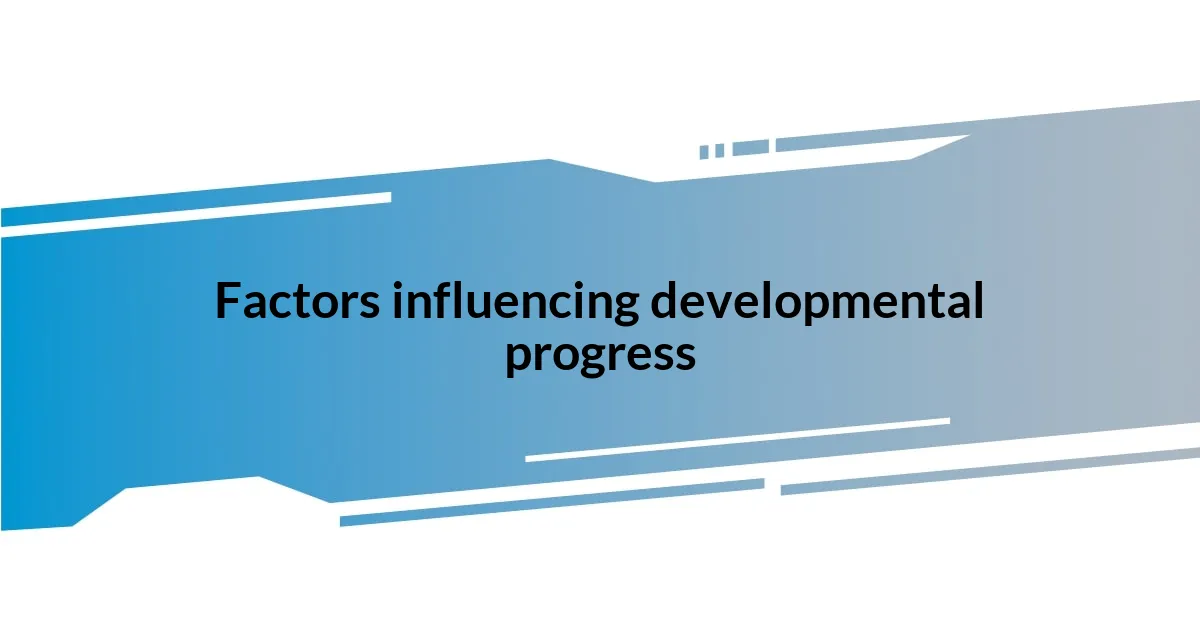
Factors influencing developmental progress
When I think about the factors influencing developmental progress, one of the first things that comes to mind is the environment. I remember how the space around my children played a huge role in their exploration and learning. For instance, having a safe play area filled with varied toys allowed them to experiment and develop new skills. What impact does your child’s environment have on their growth?
Another important factor is parental involvement. I’ve noticed that the more I engaged in my children’s activities, the more they flourished. When I sat down to read with them, it sparked their curiosity and accelerated their language skills. Sometimes, even just singing silly songs together created moments of joy that made learning feel effortless. How much time do you spend nurturing those little moments?
Social interactions also cannot be overlooked. I’ve seen my kids light up while playing with peers, learning how to share and communicate effectively. I remember when my daughter first played a game with her friends; the laughter and teamwork were priceless. It’s such a reminder of how important friendships are in shaping our children’s emotional intelligence. Isn’t it amazing how these early experiences lay the groundwork for their future relationships?
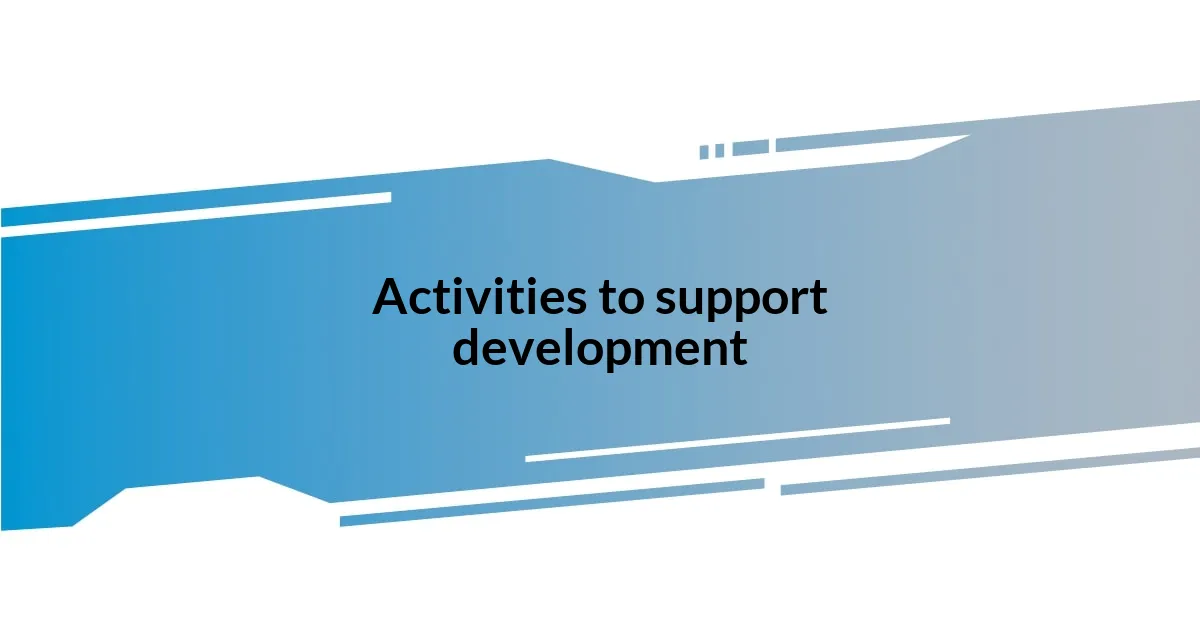
Activities to support development
One of the most delightful activities I’ve seen promote development is simple sensory play. I remember making a homemade sensory bin filled with rice and small toys for my children to explore. The joy in their faces as they sifted through the rice, uncovering hidden treasures, was priceless! Engaging in this kind of play not only sparked their curiosity but also honed their fine motor skills, allowing them to grasp, pinch, and pour with increased confidence and control.
Another effective way to support development is through imaginative play. I often set up a small play kitchen in our living room. Watching my toddler “cook” and serve meals opened up a world of creativity and language. It was amazing to see her create stories around her pretend meals, giving me insight into her thoughts and feelings. Isn’t it fascinating how such unstructured play fosters problem-solving skills and emotional expression?
Don’t underestimate the power of reading together as a bonding and developmental tool. I still cherish those quiet moments curled up with a book, my kids snuggled beside me, their eyes wide with wonder. Choosing stories that resonate with their experiences can ignite their imagination and improve their vocabulary. What was your favorite story to share with your children? Each page turned brings not just knowledge but emphasizes the importance of connection and shared experiences.
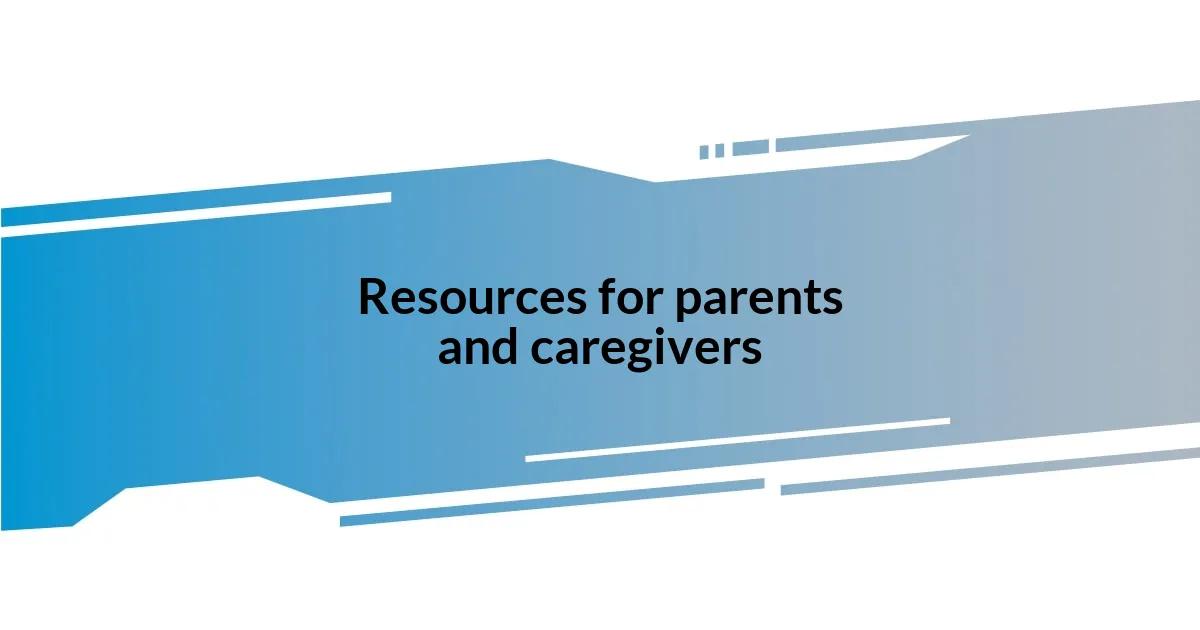
Resources for parents and caregivers
One invaluable resource I found was the local early childhood center. I remember the staff there organizing workshops that addressed everything from developmental milestones to effective parenting strategies. Attending those sessions not only gave me insights but also connected me with other parents facing similar challenges. Have you ever considered tapping into your community for support?
Books are another wonderful resource for parents and caregivers. I still refer to a couple of parenting books that outlined developmental stages in a clear and engaging way. They helped me understand not just what to expect but also provided activities to foster growth. Which book do you find yourself revisiting during those parenting moments?
Online forums and social media groups can also provide a wealth of shared experiences. I’ve found that joining a parenting group on social media opened up a world of dialogue and support that I never anticipated. Suddenly, I was surrounded by voices echoing my own concerns and triumphs—it’s a reminder that we’re all in this together. Have you sought out these communities to share your journey?